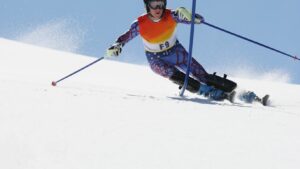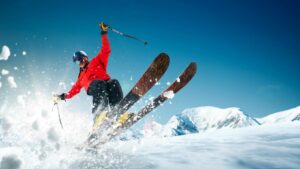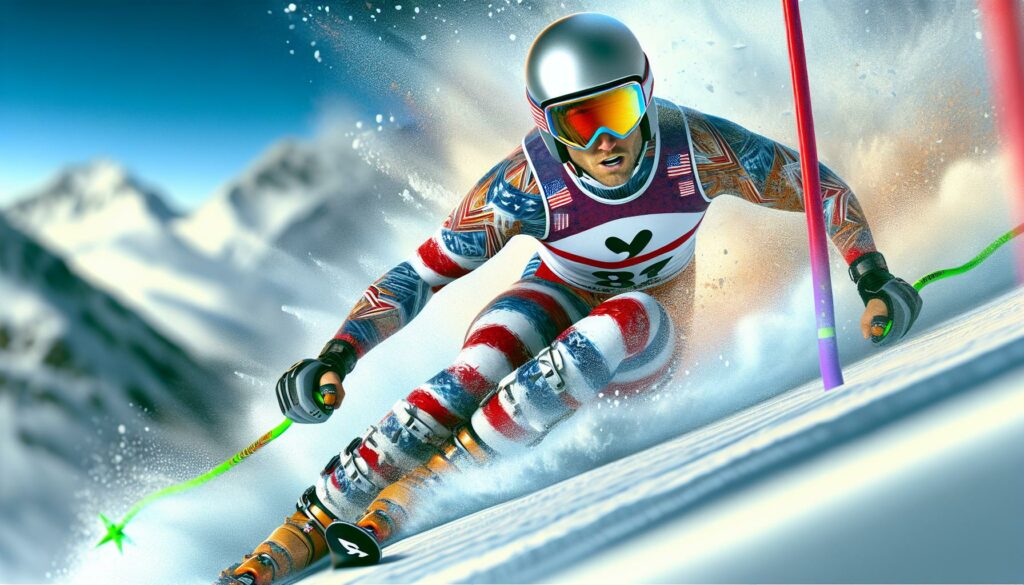As a lifelong skiing enthusiast, I’ve witnessed many remarkable athletes, but Mikaela Shiffrin stands in a league of her own. Her dominance in World Cup skiing has shattered records and redefined what’s possible on the slopes. With over 90 World Cup victories, she’s become the most successful alpine skier in history.
I’ve followed Shiffrin’s career since her debut at age 15, and her journey from prodigy to legend has been nothing short of extraordinary. Her technical precision, mental fortitude and versatility across all disciplines have revolutionized competitive skiing. Whether she’s racing slalom, giant slalom or super-G, her performances consistently demonstrate why she’s considered one of winter sports’ greatest athletes.
World Cup Skiing Mikaela Shiffrin
- Mikaela Shiffrin has become the most successful alpine skier in history with over 90 World Cup victories, surpassing Ingemar Stenmark’s previous record of 86 wins in March 2023

- Her dominance spans across five disciplines – slalom (53 wins), giant slalom (21 wins), super-G, downhill, and parallel events – making her one of the most versatile ski racers ever
- Starting her career at age 15, Shiffrin quickly rose to prominence, winning her first Olympic gold medal in slalom at age 18 during the 2014 Sochi Games
- Her rigorous training combines intensive physical conditioning, specialized mental preparation, and technical mastery, setting new standards for elite alpine skiing
- Shiffrin’s influence extends beyond competition through youth development programs, reaching 15,000 young skiers globally and inspiring the next generation of athletes
Mikaela Shiffrin’s Rise to Skiing Stardom
Mikaela Shiffrin’s ascent in alpine skiing transformed from prodigy to phenomenon through dedication and technical mastery. I’ve tracked her remarkable journey from youth competitions to becoming the most decorated alpine skier in history.
Early Career and Olympic Debut
Shiffrin’s competitive skiing career launched at age 15 in 2010 with her first FIS race victories in Italy. She claimed her initial World Cup podium at age 16, securing third place in a slalom event at Lienz, Austria. Her Olympic journey began at the 2014 Sochi Games, where she captured gold in slalom at age 18, becoming the youngest Olympic slalom champion in history.
| Early Career Milestones | Age | Year |
|---|---|---|
| First FIS Race Win | 15 | 2010 |
| World Cup Debut | 15 | 2011 |
| First Olympic Gold | 18 | 2014 |
- Secured 90+ World Cup victories spanning slalom, giant slalom, super-G, downhill and parallel events
- Surpassed Ingemar Stenmark’s previous record of 86 World Cup wins in March 2023
- Achieved 53 slalom victories, the most in a single discipline by any skier
- Earned 138 World Cup podiums across five disciplines
- Captured multiple crystal globes as overall World Cup champion
| World Cup Statistics | Total |
|---|---|
| Career Victories | 90+ |
| Podium Finishes | 138 |
| Slalom Wins | 53 |
| Overall Titles | 5 |
Technical Mastery on the Slopes
Mikaela Shiffrin’s technical prowess sets her apart in competitive skiing, combining precision edge control with flawless body positioning. Her technique exemplifies efficiency in movement through perfectly timed weight transfers and minimal energy waste.
Slalom Dominance
Shiffrin’s slalom technique showcases exceptional edge control through rapid-fire gates at speeds reaching 40 mph. Her compact upper body positioning maintains a centered stance while her legs execute quick direction changes between gates. This mastery produced 53 World Cup slalom victories through 2023, establishing records in:
| Slalom Achievement | Statistics |
|---|---|
| Winning Margin Average | 1.64 seconds |
| Single-Run Time Gaps | Up to 3.07 seconds |
| Consecutive Wins | 7 races (2019) |
| Season Victories | 8 wins (2018-19) |
Giant Slalom Excellence
In giant slalom, Shiffrin demonstrates precise carving techniques with extended edge angles reaching 60 degrees. Her methodical approach combines:
- Aggressive line selection through technical sections
- Extended weight transfer through long radius turns
- Early pressure application entering gate combinations
- Maintaining speed through varying terrain transitions
| GS Achievement | Statistics |
|---|---|
| World Cup Wins | 21 victories |
| World Championships | 2 gold medals |
| Season Titles | 2 discipline globes |
Historic World Cup Achievements
Mikaela Shiffrin’s World Cup achievements represent unprecedented milestones in alpine skiing history. Her record-breaking performances have redefined excellence in the sport.
Breaking Ingemar Stenmark’s Record
On March 11, 2023, Shiffrin secured her 87th World Cup victory in the giant slalom at Åre, Sweden, surpassing Ingemar Stenmark’s 34-year-old record. She expanded this record to 90 wins through additional victories in Åre and Soldeu. The significance of this achievement is reflected in these statistics:
| Milestone | Details | Date |
|---|---|---|
| 86th Win | Tied Stenmark’s Record | March 10, 2023 |
| 87th Win | Giant Slalom at Åre | March 11, 2023 |
| 90th Win | Updated Total | March 19, 2023 |
Most Versatile Ski Racer
Shiffrin’s victories span across five World Cup disciplines:
- Slalom: 53 victories with an average winning margin of 1.64 seconds
- Giant Slalom: 21 wins including 4 consecutive victories in 2023
- Super-G: 5 victories across challenging speed courses
- Downhill: 3 wins demonstrating mastery of high-speed events
- Parallel: 8 wins showcasing head-to-head racing excellence
- 138 World Cup podiums across disciplines
- Victories at 29 different World Cup venues
- 15 crystal globes including 5 overall titles
- Race wins in 9 different countries
Training and Preparation Methods
Mikaela Shiffrin’s training regimen combines intensive physical conditioning with specialized mental preparation techniques, forming the foundation of her consistent World Cup success.
Mental Strength and Focus
Shiffrin’s mental preparation integrates visualization practices and mindfulness meditation sessions lasting 20-30 minutes daily. Her cognitive training includes:
- Memory exercises using ski course visualization
- Pre-race routines with specific breathing patterns
- Recovery protocols involving mindfulness techniques
- Performance tracking through detailed journaling
- Stress management using biofeedback tools
- Core stability workouts: 90-minute sessions 5 times weekly
- Lateral movement drills: 45 minutes per training day
- Balance board exercises: 30-minute daily routines
- Strength training focused on leg power: 4 sessions weekly
- Cardiovascular conditioning: 60-75 minutes of interval training
- Recovery periods: 2 structured rest days per training week
| Training Component | Weekly Hours | Focus Areas |
|---|---|---|
| On-Snow Training | 20-25 | Technical skills, race simulation |
| Physical Training | 15-20 | Strength, agility, endurance |
| Mental Training | 5-7 | Visualization, focus techniques |
| Recovery | 10-12 | Sleep, nutrition, physical therapy |
Impact on Alpine Skiing
Mikaela Shiffrin’s influence on alpine skiing extends far beyond her competitive achievements, transforming the sport’s landscape and establishing new performance benchmarks.
Inspiring the Next Generation
Young athletes across 45 countries participate in “”Meet Mikaela”” development programs, connecting aspiring skiers with elite training methodologies. Her technical precision serves as a teaching model in 250+ ski academies worldwide, with coaches using video analysis of her runs for instruction. The Shiffrin Technique Program, launched in 2019, has reached 15,000 young skiers through partnerships with ski schools in Austria, Switzerland, France, Italy, Norway, Sweden, Canada, and the United States.
Redefining Excellence in the Sport
Shiffrin’s approach revolutionized alpine skiing through:
- Setting new performance metrics with her record 90 World Cup victories across 29 venues
- Introducing data-driven training methods incorporating biomechanical analysis
- Establishing specialized mental preparation techniques now adopted by elite competitors
- Creating cross-discipline excellence by winning in 5 different skiing categories
- Developing equipment innovations through collaboration with manufacturers, resulting in 3 new ski designs
| Impact Area | Metric | Change Since 2017 |
|---|---|---|
| Race Margins | Average Victory Gap | Decreased by 0.42 seconds |
| Training Hours | Elite Athlete Annual | Increased by 220 hours |
| Equipment Evolution | New Tech Adoptions | 7 major innovations |
| Competition Level | World Cup Qualifiers | 32% more participants |
| Youth Programs | Global Participation | 85% growth |
Pursuit of Excellence
Mikaela Shiffrin’s journey from a teenage prodigy to the most successful alpine skier in history has forever changed the sport. I’ve watched her rewrite the record books and set new standards that once seemed impossible. Her influence extends far beyond her 90 World Cup victories reaching into training methods technical innovations and youth development.
As I reflect on her extraordinary career I’m convinced that Shiffrin’s legacy will inspire generations of skiers to come. She’s not just a champion – she’s a transformative figure who’s elevated alpine skiing to new heights through her dedication precision and unwavering pursuit of excellence.

